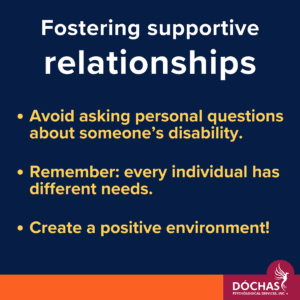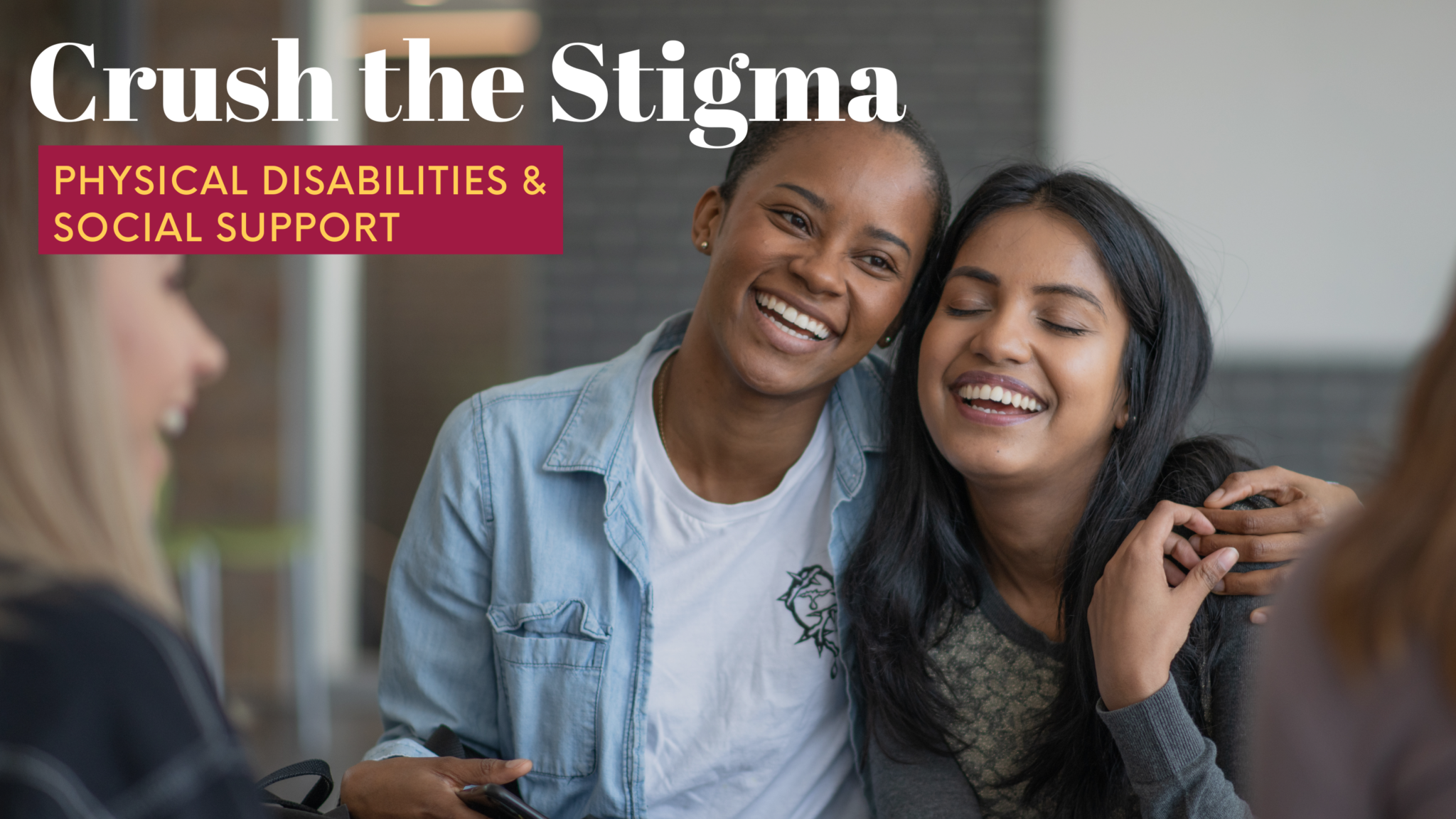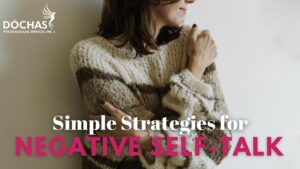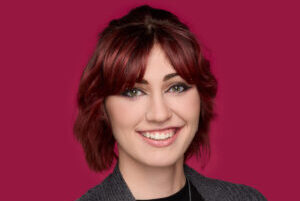Happy Disability Pride Month! Whether you’re newly disabled or have been your entire life, this month is one of celebration, recognition, advocacy, and education for everyone. It’s Tat on the blog this week – I’d like to talk about the relationship between physical disabilities and social support, how it impacts our mental health, and how we can crush some of the stigma that affects these relationships.
Why is Social Support So Important?
Supporting and maintaining your physical health is often at the forefront when you become physically disabled, and for good reason! However, the intense focus placed upon ensuring you receive the proper treatment and can stay physically active means that mental well-being is often neglected. Resources to support disabled individuals’ mental health are limited and can be difficult to access. Social support is one of the easiest-to-access resources available to anyone and can greatly improve mental health. It is especially important in youth and adolescence – this is when it has the greatest impact on our mental health and well-being.
Why is discussing social support so important? Just like accessing care, disabled persons often have a difficult time establishing and maintaining social relationships. Between increasing numbers of medical appointments and supportive care that is often needed, there are issues of accessibility and ability that often impact these relationships, along with the negative stigma that being disabled holds to this day! With these increased needs, social support becomes even more important in improving overall well-being.
Improving Social Support by Crushing Stigma
If social support has such a positive impact, what can we do to improve access to it? As an able-bodied person, much can be done!
Educating yourself on your family, friend, or partners’ needs can be so helpful in defeating the negative stigma often faced. It’s okay (and often even encouraged) to ask what a person needs at any given moment, regardless of their ability. The most important part is treating the other person like they are a capable human being; because they are!
Tips for Fostering Supportive Relationships

- Don’t avoid the use of the word disabled!
- Differently abled, “suffers from a disability”, handicapable, and diversability are not good alternatives. Sometimes person-first language (person with a disability) isn’t either. Most importantly, disabled isn’t a bad word.
- Don’t assume someone needs help just because they have a mobility aid.
- If you see someone struggling, ask if they would like help just as you would anyone else.
- Avoid asking personal questions about someone’s disability, especially if you don’t know the individual personally!
- This would be like asking a stranger for personal medical information. Some disabled people are okay with general questions for the sake of education, but not all. Check before you ask.
- Every individual has different needs.
- Again – this is true regardless of ability! No two disabilities are exactly the same. While this can feel isolating at times, it does not mean that no experience is shared, just that there should not be an expectation that every disabled person needs – or wants – the same support.
- Foster a positive environment!
- The emphasis here lies in creating supportive relationships. To do so means creating a positive environment for disabled people to exist in. Be open-minded and accepting of others’ experiences and bear in mind that disabled people are people. Our differences just mean we might need some extra help navigating the world or we may need to do things a little differently – and that’s okay.
Final Thoughts
Social support benefits everyone! Be supportive and help decrease stigma to improve mental health and allow everyone to build strong and meaningful relationships. I invite you to reach out at 780-446-0300 or info@dochaspsych.com with any questions you may have about managing your own disability or supporting someone that has one.
References
Fekete, C., Tough, H., Arora, M., Hasnan, N., Joseph, C., Popa, D., Strom, V., and Middleton, J. (2021). Are social relationships an underestimated resource for mental health in persons experiencing physical disability? Observational evidence from 22 countries. International Journal of Public Health, 66. https://doi.org/10.3389/ijph.2021.619823
Rohrbeck, C., & Wirtz, P. (2023). Age differences in emotional support buffering on the relationship between physical disability and psychological distress. Journal of Social and Personal Relationships, 41(4), 754-770. https://doi.org/10.1177/02654075231214971
Tough, H., Siegrist, J., & Fekete, C. (2017). Social relationships, mental health and wellbeing in physical disability: A systematic review. BMC Public Health, 17. https://doi.org/10.1186/s12889-017-4308-6
About Dóchas Psychological
Dóchas Psychological Services is a well-established and trusted therapy clinic located in Spruce Grove, Alberta. At Dóchas we value the idea that everyone deserves a safe space. Through connection and education, our team works hard to build a trustworthy relationship with each of our clients. It is our goal to create a community for our clients to feel like they belong.
Disclaimer
Information provided through Dóchas Psychological Services blogs or vlogs is meant for educational purposes only. They are NOT medical or mental health advice. You can read more about our disclaimer here.










